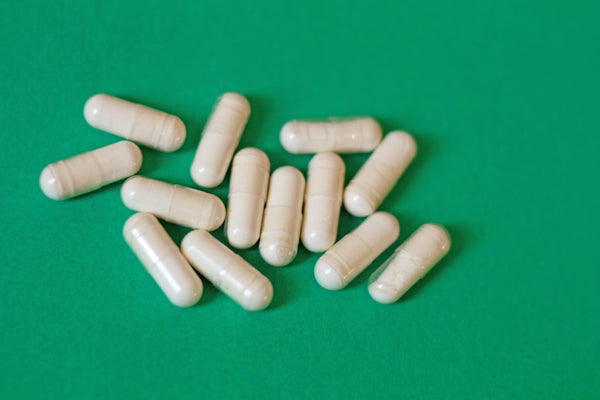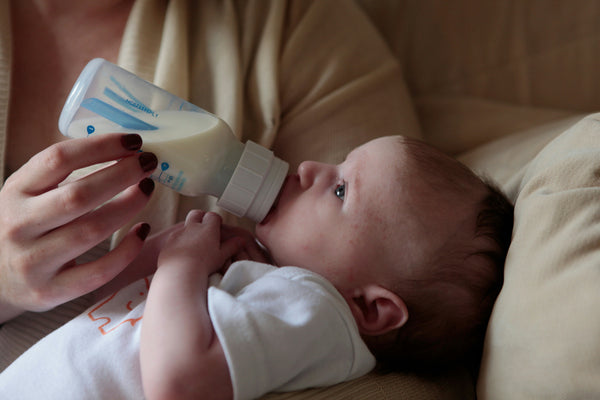How to Ease Constipation in Kids with IBS
How Prebiotics Support Irritable Bowel Syndrome
share this article

Irritable Bowel Syndrome (IBS) is a common yet challending diagnosis that effects 10-15% of kids (1). It’s diagnosed when a kid has abdominal pain for at least 4 days of the month related frequency or consistency of their stools.
There are three types of IBS: IBS with diarrea (IBS-D), IBS with constipation (IBS-C), and a mix of both (IBS-M). IBS-C is the most common form, accounting for 45% of people who are diagnosed (2).
Because lifestyle changes make up such a big part of managing IBS-C, it’s important to have kid-friendly tactics to reduce constipation in your little one.
Why IBS Can Cause Constipation
Gastrointestinal Infection & Inflammation
Your kid’s gut function can be altered by food allergies, low fiber, high sugar intake, a weak immune system, and infections like food poisoning or viruses (1).
This can throw off the balance of gut bacteria and increase inflammation which slows the rate of digestion, leading to constipation.
Hyperactive Nervous System
The gut and brain are connected through the gut-brain axis, which is why digestive issues often show up alongside mental health struggles. Kids with IBS can often experience emotional instability, anxiety, or depression (1).
Research shows that these mental health concerns can send their autonomic nervous system into overdrive, leading to gut hypersensitivity and even physical gut inflammation (1).
Having an extra sensitive or inflamed gut can cause your little one to struggle with withholding stools or a slower rate of digestion.
Low Intake of Fiber
Although low fiber intake might have been part of the problem, eating too much fiber too quickly can cause bloating, gas, and abdominal pain, often leading to an aversion to high-fiber foods.
Many kids with IBS also follow a low FODMAP diet, which eliminates high-fiber foods that ferment in and cause gas.
This combination of food aversion and dietary restrictions can worsen constipation because fiber adds bulk to stools and makes them easier to pass.
How to Reduce Constipation Symptoms for Kids with IBS
Introduce Low Fodmap Fiber Slowly
One of the best ways to reduce inflammation in the gut, strengthen the gut lining, and reduce symptoms of constipation is to eat more fiber. However, as we discussed, fiber can be a challenge for kids with IBS. That’s why it’s key to introduce the right kind of fiber at the right pace.
Fiber-rich foods that are low in FODMAPs (Fermentable Oligosaccharides, Disaccharides, Monosaccharides, and Polyols) are less likely to ferment in the gut and cause gas, bloating, or abdominal pain.
While many high-fiber foods like beans, grains, and vegetables contain these FODMAPs, there are several options for kids with IBS to still meet their daily fiber needs.
Low FODMAP, high-fiber foods include:
-
Brown Rice
-
Quinoa
-
Raspberries
-
Flax Seeds
-
Pumpkin Seeds
-
Chia Seeds
-
Green Beans
-
Carrots
-
Chickpeass
-
Gluten-Free Bread
Despite the fact that these low FODMAP foods are easier to digest, kids with IBS need to introduce fiber slowly to train their guts to tolerate it. In the same way that we gradually train our muscles with exercise, the gut can be conditioned to better manage fiber and even prevent symptoms of constipation.
Start with a small serving of a low FODMAP, fiber-rich food once a day, and gradually increase to include it at every meal if no symptoms arise.
Increase Hydration
When kids with IBS are dehydrated, their stools can become hard which can further contribute to constipation. Proper hydration has been shown to increase frequency of stool and lower dependence on laxatives for those with IBS-C (3).
According to the American Academy of Pediatrics, aim for 4 cups of water for 1-3-year-olds, 5 cups for 4-8-year-olds, and 7-8 cups for kids 9+.
Nurture the Gut Microbiome
Your kid’s microbiome is the ecosystem of bacteria in their gut which impacts abdominal symptoms, stool frequency, and communicates to the nervous system through the gut-brain axis.
Kids with IBS-C often have a dysbiosis, or imbalance in the good and bad bacteria, in their microbiome (1). To replenish good gut bacteria, encourage both prebiotics and probiotics in your kid’s diet.
Prebiotics are fibers that feed gut bacteria, helping them produce short-chain fatty acids (SCFAs), which support gut health, reduce inflammation, and improve digestion.
The prebiotics found in Begin Health Growing Up Prebiotics are tasteless, textureless, and can help ease constipation symptoms within 6 weeks of daily use (4).
Probiotics are beneficial bacteria that help balance the microbiome, reduce gut inflammation, and produce SCFAs, which work together to ease symptoms of constipation. Probiotics are naturally found in fermented foods like yogurt, kefir, and sauerkraut.
Limit Processed Foods
Although we already discussed that foods high in FODMAPs are known to contribute to IBS-C symptoms, it’s worth it to highlight that a general avoidance of processed foods and is helpful even if you don’t strictly follow low fodmap.
While the low FODMAP diet is proven to reduce symptoms of IBS-C, simply limiting processed foods is a less restrictive, yet substantial method to relieving constipation. Processed foods like starches, high-fat fried foods, and sugary snacks often lack fiber and can contribute to the gut’s inflammation (5).
Summary
Kids with IBS can experience constipation due to GI inflammation, an overactive nervous system, or not eating enough fiber. To relieve these symptoms, slowly introduce low FODMAP fiber, encourage water intake, utilize prebiotics and probiotics, and limit processed foods.
















